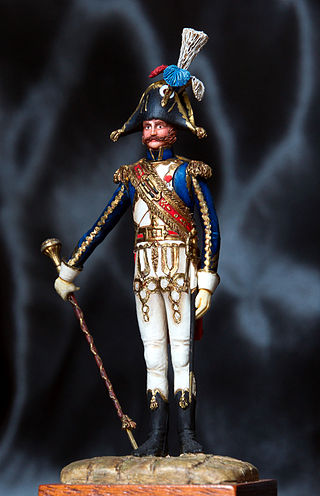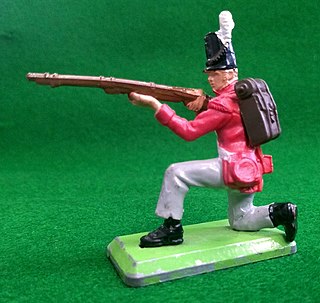
An action figure is a poseable character model figure made most commonly of plastic, and often based upon characters from a film, comic book, military, video game or television program; fictional or historical. These figures are usually marketed toward boys and adult collectors. The term was coined by Hasbro in 1964 to market G.I. Joe to boys.

Airfix is a British brand and former manufacturing company which produced injection-moulded plastic scale model kits. In the U.K., the name 'Airfix' is synonymous with plastic models of this type, often simply referred to as "an airfix kit" even if made by another manufacturer.
The Mego Corporation was an American toy company that in its original iteration was first founded in 1954. Originally known as a purveyor of dime store toys, in 1971 the company shifted direction and became famous for producing licensed dolls, celebrity dolls, and the Micronauts toy line. For a time in the 1970s, their line of 8-inch-scale action figures with interchangeable bodies became the industry standard.

A toy soldier is a miniature figurine that represents a soldier. The term applies to depictions of uniformed military personnel from all eras, and includes knights, cowboys, American Indians, pirates, samurai, and other subjects that involve combat-related themes. Toy soldiers vary from simple playthings to highly realistic and detailed models. The latter are of more recent development and are sometimes called model figures to distinguish them from traditional toy soldiers. Larger scale toys such as dolls and action figures may come in military uniforms, but they are not generally considered toy soldiers.

Action Man is an action figure launched in Britain in 1966 by Palitoy as a licensed copy of Hasbro's American "movable fighting man", G.I. Joe.

A model figure is a scale model representing a human, monster or other creature. Human figures may be either a generic figure of a type, a historical personage, or a fictional character.
Corgi Classics Limited is a British die-cast scale model manufacturer established as an independent company in 1984, which has its origins in the Corgi Toys brand introduced by Mettoy in 1956. It is known for its British and North American vehicle models.
The history of Lego began in 1932, when Ole Kirk Christiansen founded the company in a Danish carpentry workshop, and continues into the 21st century as a popular and very profitable line of construction toys and related products and services, with a significant impact on various areas of popular culture. Despite its expansion, the company remains privately held.

Army men, or plastic soldiers, are toy soldiers that are about 5 cm (2.0 in) tall and most commonly molded from olive green, relatively unbreakable plastic. Unlike the more expensive toy soldiers available in hobby shops, army men are sold at low prices in discount stores and supermarkets in bulk packaging. Army men are traditionally green and almost always dressed in modern military uniforms and armed with 20th-century weapons. 'Jumbo' army men are a less common secondary scale with 4.75-inch (12.1 cm) soldiers made with the same process.
Dragon Models Limited is a Hong-Kong-based manufacturer of plastic model kits, diecast models and military action figures. Founded in 1987, the company shares distribution agreements with Stevens International in the United States, Revell/Monogram, Revell Germany and Italeri in Europe, and Hasegawa and GSI in Japan.
G.I. Joe: Classic Collection is an action-figure-and-accessories set produced by Hasbro US in a style initially influenced by the Hasbro G.I. Joe products of the 1960s. The set was first released in 1996.

G.I. Joe: America's Movable Fighting Man is a line of action figures produced by Hasbro. The initial product offering represented four of the branches of the U.S. armed forces. The term G.I. stands, in popular usage, for Government Issue and became a generic term for U.S. soldiers, especially ground forces. The term originated in WWI, when much of the government-issued equipment was stamped "G.I.", meaning that it was made from galvanized iron. The development of G.I. Joe led to the coining of the term "action figure".
Britains, earlier known by the founder's name W. Britain, is a British toy brand and former manufacturing company known for its die-cast scale models of agricultural machinery, and figurines. The company was established in 1893 as a toy soldiers manufacturer.

Britains' Deetail toy soldiers were a popular product in the 1970s and 1980s. Manufactured in England by W. Britain, the 1/32 (54mm) scale plastic figures were finished with hand painted details and came with sturdy Zamak metal bases. In the early 1990s production moved to China before eventually being phased out.
Roy Selwyn-Smith, was well known as a sculptor of English plastic figures and toy soldiers.
Crescent Toys was a British toy manufacturing company in operation from 1922 to 1980.
Manoil Manufacturing Company was an American metal and plastic toy company that began production in 1935 or 1936, and left the business in 1959. From June 1940 they were located on Providence Street, in Waverly, NY. Its prominence was from 1937-1941 when it produced hollowcast toy soldiers along with toy airplanes and cars.
The Barclay Manufacturing Company was an American metal toy company based in New Jersey that specialised in diecast toy cars and hollowcast toy soldiers. Due to their common availability at five and dime stores, collectors often refer to Barclay's toy soldiers as "Dimestore soldiers".
Dimestore soldiers are a name first given by collector and author Don Pielin to American made toy soldiers sold individually in five and dime stores from the 1930s to the 1950s before being replaced by plastic toy soldiers called army men. Though most figures were hollowcast metal, composition and plastic dimestore figures were also made. The popularity of the toy soldier reflected public interest in wars around the world and America's own military preparedness of the era. The largest dimestore companies are: Barclay, Manoil, Grey Iron, and Auburn.

Timpo Toys Ltd. was a British toy company created in 1938 by Salomon "Sally" Gawrylovitz, also known as Ally Gee.








